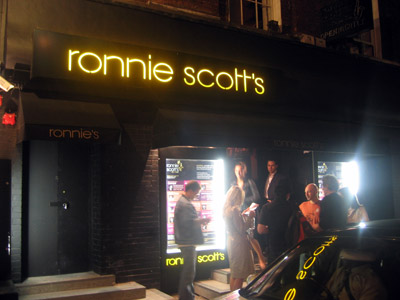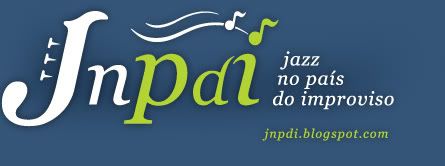
JNPDI: Why did you decide to come to Portugal?
Daniel Hewson: I have been living in London for 12 years, working as a musician. Having collaborated with many musicians over there, I wanted to find time to focus on my own projects. Then an opportunity presented itself to move to Portugal and I decided a change of scene would be an inspiration to me. I have always been inspired by the culture of the Iberian peninsula, and moving here has been a revelation, a return to simple values. Portugal has been an inspiring change for me and my head is full of new ideas.
JNPDI: As far as I know you had a classical training. How did you get interested in jazz?
DH: I grew up in a musical household; my mother is a classical pianist and my father a jazz guitarist and composer. So my early musical influences were Chopin nocturnes in one ear and Miles Davis in the other! My musical education was purely classical; I took piano and composition lessons and played trombone in the National Youth Orchestra where I got to know the classical repertoire of composers such as Ravel, Bartok and Stravinsky. I had been improvising at the piano from a very early age and the composer in me was keen to explore new musical territory. When a cellist from the orchestra lent me a couple of jazz piano books, I was hooked! I found a whole new harmonic and rhythmic language with which to express myself, but one that drew from sources I knew well, such as the music of Ravel. The freedom and creative possibilities of jazz were more appealing to me than the discipline of practising to be a classical performer.
JNPDI: Being at ease both on classical and jazz music how do you consider yourself: a classical musician that plays jazz or a jazz musician that plays classical?
DH: I really don't know, I have often asked myself that question. There is obviously a distinction in terms of the language and discipline of classical music and jazz. But I have felt at home with both languages for so long that it's difficult to make a distinction. I think being primarily a composer I would consider myself a jazz musician that has his roots in classical music. For me it's all about improvisation. The technique to play an instrument should be the same regardless of the musical style.
JNPDI: What are your references in the jazz piano?
DH: The first big influence for me was my father's recordings of Bill Evans. He was an absolute master and for me he defined modern jazz piano. Bud Powell and Herbie Hancock are towering figures, and Art Tatum and Errol Garner astonish me in terms of their sheer virtuosity. Keith Jarrett, Brad Meldhau and John Taylor are big influences at the moment.
JNPDI: What do you want to accomplish in music?
DH: I want to focus on composition, writing larger-scale projects. I have a commission to compose a concerto for the German pianist Andreas Boyde, with orchestra and integrated big band. Ultimately I would like to write scores for film, theatre and dance companies. I see composition as a craft, a slow process of writing and refining. It can take a week to compose ten minutes of perfect music, whereas a ten minute jazz improvisation takes ten minutes to create! However I still love playing and I want to continue to perform and record jazz, focussing on my own group where I can try out new compositional ideas.
JNPDI: Where do you see yourself musically in 10 years?
DH: I would like to be composing more, but still performing. I would like to be writing film scores, ballet scores, concert works and piano pieces. At the same time, I would be happy doing a gig with my quartet in a jazz club - it's all about balance for me.
JNPDI: What about expectations for this stay in Portugal?
DH: Lisbon is an inspiring place to live for a musician, with its mixture of trends and dynamic cultural events. I also want to draw on my experiences of the Portuguese countryside, the simple lifestyle and the warmth of the people there. I hope to collaborate with some of the excellent musicians living and working here. At the same time I hope also to initiate an exchange program with the British Council, to bring UK jazz musicians over to Portugal on a cultural exchange. I think we have much to learn from each other's culture.
JNPDI: You are releasing a classical CD by the end of this year. What about a Jazz CD? Tell us about both projects.
DH: The classical CD is my debut album of original compositions, to be released on Music Chamber Records.There are pieces for string quartet, piano quintet, cello and piano, and piano solo. I am be travelling back to the UK soon to finish recording, and the album launch will be in November, at Leighton House in London. I'm very excited about it! The jazz CD is also based around my compositions, and features some wonderful musicians; the multi-instrumentalist Charlotte Glasson, Jonny Gee on bass and Eduardo Marques on drums. We will be returning to the studio to finish the album off and I hope to release it on 33 Records in the UK.
JNPDI: Is it easy to become a jazz musician in England?
DH: Yes, provided you play! There are great opportunities for music education in the UK and the level of jazz education has improved immensely in the last 20 years. Now aspiring young musicians can benefit from an early exposure to jazz and improvisation at a young age. There are the youth jazz orchestras, diplomas and post-graduate course in jazz. I was working at Westminster School running a junior jazz project, arranging and directing a jazz ensemble for the kids. One of my top students just gained a place to study jazz piano at Royal Holloway College. The possibilities are endless and it's very encouraging to see the new generation of musicians emerging. The level of performance in England is high, and the scene is quite dynamic and competitive. It's easy to become a jazz musician, it's not necessarily so easy to make a living as one!
Soweto Kinch
JNPDI: How would you describe the British Jazz scene?
DH: Very healthy. There are a lot of exciting bands around and many up and coming artists working along side established ones. In the big cities, particularly London,there are musicians from all over the world - Europe, USA, South America and the Carribean. You find musical influences from the Afro-Carribean, Cuban, Brazillian and Balkan musicians, from Hip-Hop and R&B artists. It all goes into the big stylistic melting-pot that is the UK jazz scene. Soweto Kinch is one example; a London based saxophonist who's music is a mixture of jazz and hip-hop elements. There is my friend Idris Rahman's band Soothsayers, a jazz/afro-beat crossover project.
JNPDI: Which British jazz musicians do you think will achieve some importance in the jazz community worldwide?
DH: There are a lot of rising artists that I think will break into the worldwide jazz scene. There are a lot of rising stars and it's always hard to know which will break through. The Neil Cowley Trio, fresh from winning BBC jazz award album of the year 2007, looks set to do very well. Pianists Zoe Rahman and Gwylim Simcock are releasing great albums of original compositions that cross the boundries between jazz, classical and world music. Saxophonist Jason Yarde is making a good name for himself on the inernational scene, and saxophonist Soweto Kinch and trumpeter Abram Wilson make regular appearances at the top jazz festivals in the UK, where they can build an international profile.
JNPDI: Where in London can a reader of this blog listen to good Jazz? Any suggestions?
DH: You have the established venues, such as Ronnie Scott's and Pizza Express Dean Street for the big international names. Good venues to see UK jazz talent are 606 Club in Chelsea, the Vortex Jazz Bar in Dalston and the Spice of Life, Soho. There are also loads of great jazz festivals throughout the year, like the Brecon festival in Wales, the Ealing Jazz festival and the Soho Jazz Festival. There are a always great sessions going on in the back rooms of pubs, like my old local venue the Effra Tavern in Brixton. And there are the free foyer concerts at the Festival Hall and the Barbican. My advice to anyone travelling to London is to get hold of a copy of "Jazz in London", a monthly brochure detailing what's going on where and when.



2 Comments:
Descobri esse sítio através do blog jazzseen (brasileiro). Parabéns pelo belo trabalho.
Obrigado!
Enviar um comentário
<< Home